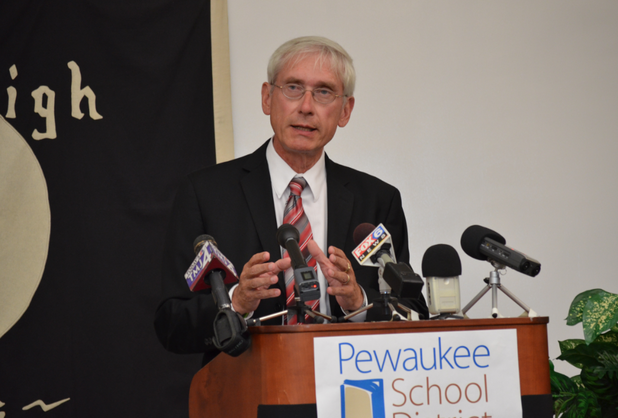
MacIver News Service | March 21, 2013
It is no secret that the education proposals included in Governor Scott Walker’s 2013-2015 budget have generated more debate than any other subject. During the agency hearing for the Department of Public Instruction before the Joint Committee on Finance Thursday, all sides weighed in.
State Superintendent Tony Evers decried the so-called “defunding of public schools” and reiterated his opposition to Governor Walker’s plan to expand educational options for children attending a school district with failing schools. Evers also praised a program that would increase testing standards in high schools and the Educator Effectiveness program that collects statewide data to help grade teachers in a similar fashion to students. Governor Walker included funding for both programs in his budget.
Evers’ main objective was to “advocate for a budget that reinvests in our public schools.” Both Evers and Democratic legislators claimed that Governor Walker’s budget would defund public education.
According to the Legislative Fiscal Bureau, funding for k-12 education in Governor Walker’s budget is $5.38 billion dollars, an increase of $276.5 million over the last budget or a 2.7% increase.
While Governor Walker’s budget does propose an increase of general school aid by $129.2 million, Evers stated in his written testimony, “those funds will reduce property taxes but not allow new spending. No new textbooks or computers.”
Representative Dean Knudson (R-Hudson) refuted this claim.
Knudson explained that the local control of property taxes would give communities the option of keeping taxes at a static level, which would easily allow school districts to invest the increase in general school aid into the classroom. Evers did later change his statement to say that it would be false to claim absolutely none of the increased funds would go toward new textbooks or computers.
In the discussion of the school choice expansion, Evers was quick to lambast the removal of funds from a public school to pay for a child to attend a choice school. “The performance in the voucher schools is no better, and sometimes worse, than MPS schools, and hardly constitutes a compelling case for expansion”, Evers said.
Evers’s testimony glossed over one of the most significant results from the School Choice Demonstration Project – that students who stayed in choice schools throughout their high school careers graduated at a higher rate than similar students in MPS schools. These choice students were also 5-7 percent more likely to enroll and stay in college after graduation.
The Superintendent did say later in the testimony that choice schools do have a lower cost to operate while providing similar results. Republicans were quick to point out that choice schools only receive $6,442 per-pupil while public school per-pupil spending has increased on average from $9,000 to $13,000 since the beginning of the millennium.
Representative Cory Mason (D-Racine) asked Evers if the Racine Choice program, which was created last session, had the same accountability as public schools. Evers stated that DPI has continued to work with choice schools to become more accountable, but he would like to incorporate more safeguards into the programs. That would include, Evers noted, applying DPI’s School Report Cards to voucher schools and grading private institutions that educate students using public funding.
However, the Superintendent expressed his concerns with the report cards, suggesting that they are currently a pilot program. Evers argued that it will take seven or eight more years before the data collection is sophisticated enough to be truly useful as the basis for policy decisions.
“We cannot afford to have any more of our children attending failing schools,” responded JFC co-chair Alberta Darling (R-River Hills) stating that parents should not have to wait up to a decade for improvement in Wisconsin’s schools.
The Joint Committee on Finance will continue agency briefings next week. The 2013-2015 budget is expected to be voted on by each house of the Legislature sometime in June.